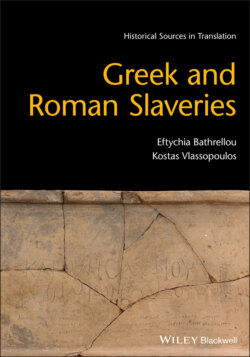Читать книгу Greek and Roman Slaveries - Eftychia Bathrellou - Страница 68
2.18 Menander, The Shield, 238–45:33 Greek Comedy (End of Fourth/Early Third Century BCE)
ОглавлениеDaos, the slave of a young Athenian who is believed to have been killed while on military campaign in Asia Minor, returns to Athens, to his master’s house, with the booty collected by the master. In this scene, Daos, who had accompanied his master on the campaign, is in conversation with a slave waiter. Hard labor at the mills is often presented as punishment for slaves. The Getai were a Thracian tribe.
Literature: Cox 2013; Konstan 2013; Bathrellou 2014; Harrison 2019.
Waiter: Be damned to perdition then, by Zeus, since you’ve done such a thing, you idiot. You had so much gold, and slaves, and you’ve returned bringing them back for your master? And you didn’t run away? Where on earth are you from?
Daos: From Phrygia.
Waiter: A good for nothing! A sissy! Only we, Thracians, are men! Oh Apollo, the Getai are the manly sort! That’s why the mills are full of us.
What does the waiter expect Daos to have done after his master’s death on campaign? How does he explain Daos’ behavior? If this was a serious conversation and not a buffoonish scene from a comedy, how do you think Daos could have justified his decision?
What are the ethnic identities of these two slaves?
How does the waiter present his own ethnic identity? What evidence does he bring in favor of his argument?
Can we take this dialogue as a realistic representation of how slaves perceived their ethnic identities and conversed with each other? Or is this merely the mirror image of Athenian assumptions about barbarian slaves?
